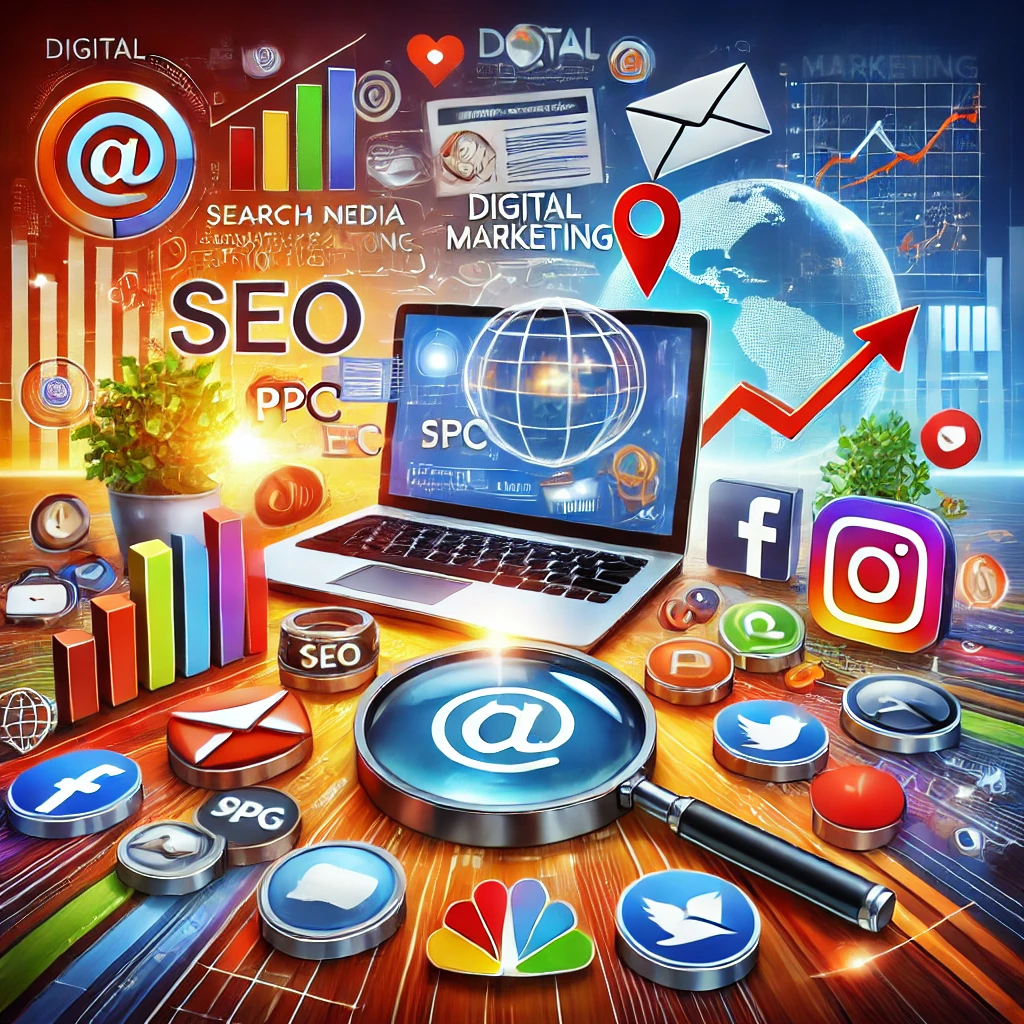
In the digital age, businesses can no longer rely solely on traditional marketing methods. With millions of people online daily, digital marketing has become a crucial tool for businesses to connect with customers and drive growth. Whether you’re a small startup or an established company, understanding digital marketing can significantly enhance your reach and success.
What is Digital Marketing?
Digital marketing refers to the promotion of products or services using digital channels such as websites, social media platforms, email, and search engines. Unlike traditional marketing, which often involves physical media (billboards, print ads), digital marketing leverages online platforms to engage with customers directly and in real-time.
Key Benefits of Digital Marketing
1. Wider Reach
With billions of internet users worldwide, digital marketing offers the opportunity to reach a global audience. No matter where your business is located, you can connect with potential customers across the world at the click of a button.
2. Cost-Effective
Compared to traditional marketing, digital marketing is often more affordable. Channels like social media and email marketing can be used at a fraction of the cost of TV or print ads, allowing small businesses to compete with larger corporations.
3. Targeted Advertising
Digital marketing allows you to reach the exact audience you want through targeted ads. Platforms like Facebook, Google, and Instagram offer advanced targeting options based on age, gender, location, and interests, ensuring your message reaches those most likely to engage with your brand.
4. Measurable Results
One of the most significant advantages of digital marketing is the ability to measure your performance. Tools like Google Analytics and social media insights provide detailed data on your campaigns, including how many people viewed, clicked, or purchased through your ads. This allows for real-time optimization.
Key Components of Digital Marketing
Here’s a breakdown of the main elements that make up a successful digital marketing strategy:
1. Search Engine Optimization (SEO)
SEO is the process of optimizing your website to rank higher in search engine results. The higher your site ranks, the more visible it becomes to potential customers searching for relevant keywords. SEO involves keyword research, content creation, and improving website structure to enhance the user experience.
2. Content Marketing
Content is king in digital marketing. Content marketing involves creating and sharing valuable, relevant material—such as blog posts, videos, or infographics—that helps attract and engage your target audience. Quality content can position your brand as an authority in your industry, building trust with potential customers.
3. Social Media Marketing
Social media platforms like Facebook, Instagram, Twitter, and LinkedIn are powerful tools for engaging with your audience, building a brand presence, and driving traffic to your website. Effective social media marketing involves creating consistent, high-quality content and interacting with followers to foster a sense of community.
4. Email Marketing
Email marketing remains one of the most effective forms of digital marketing. By building a list of subscribers, you can send personalized content directly to your audience’s inbox, nurturing relationships and driving conversions. Email marketing is great for announcing promotions, sharing updates, or delivering exclusive content.
5. Pay-Per-Click (PPC) Advertising
PPC advertising is a model where businesses pay each time a user clicks on their ad. Google Ads and Facebook Ads are popular PPC platforms, allowing you to create targeted ads that appear on search engine results or social media feeds. PPC can quickly drive traffic to your website, especially when paired with strong SEO.
Developing a Digital Marketing Strategy
Creating a successful digital marketing strategy requires careful planning. Here’s how you can get started:
1. Set Clear Goals
Determine what you want to achieve with your digital marketing. Are you looking to increase website traffic, grow your social media following, or boost sales? Clear goals help you stay focused and measure your success.
2. Know Your Audience
Understanding your audience is key. What platforms do they use? What type of content do they engage with? Conduct market research and use analytics tools to gain insights into your audience’s behavior.
3. Choose the Right Channels
Not all digital channels are right for every business. Depending on your goals and audience, you may want to focus on SEO and content marketing, or you might prioritize social media and email marketing. Start with a few key channels and expand as needed.
4. Create High-Quality Content
Quality content is essential for attracting and engaging your audience. Whether it’s a blog post, video, or social media update, make sure your content is informative, engaging, and aligns with your brand voice.
5. Monitor and Adjust
Digital marketing is constantly evolving. Monitor the performance of your campaigns using analytics tools and be prepared to make adjustments. Experiment with different strategies, test new content, and optimize for better results over time.
Conclusion
Digital marketing is a powerful tool that can help businesses of all sizes grow and thrive in the online world. By understanding its key components—SEO, content marketing, social media, and PPC—you can create strategies that connect with your audience and drive meaningful results. Remember to stay flexible and adapt to the ever-changing digital landscape, and you’ll be well on your way to success.